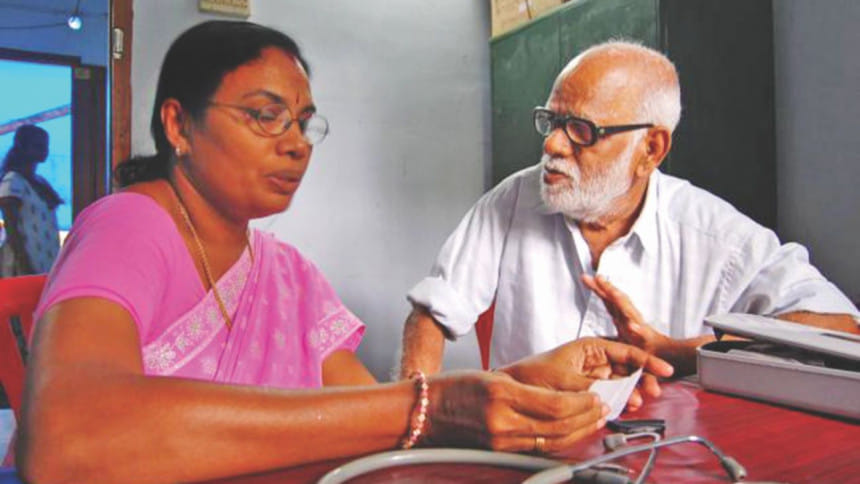Can you get rid of aging ailments?

What to expect as you get older and what to do about it? We all know that aging will likely cause you to develop wrinkles and gray hair. But do you know how the aging process will affect your teeth, heart, bones, eyes and sexuality? Find out what kind of changes you can expect in your body as you continue aging and what can you do to keep your good health at any age.
What is happening to your heart?
As you age, your heart rate becomes slightly slower and your heart might become bigger. Your blood vessels and your arteries also become stiffer, causing your heart to work harder to pump blood through them. This can lead to high blood pressure or heart attack. So what you can do to keep your heart healthy?
Include physical activity in your daily routine: Try regular walking, swimming or other aerobic exercise you enjoy. Regular moderate physical activity can help you maintain a healthy weight, lower blood pressure and lessen the extent of arterial stiffening.
Eat a healthy diet: Choose vegetables, fruits, whole grains, high-fiber foods and lean sources of protein, such as fish. Limit foods high in saturated fat and sodium (like kacchi biriyani and fast food).
Don't smoke: Smoking contributes to the hardening of your arteries and increases your blood pressure and heart rate. If you smoke or use other tobacco products, try to quit.
Manage stress: Stress can take a toll on your heart. Take steps to reduce stress or learn to deal with stress in healthy ways.
Get enough sleep: Quality sleep plays an important role in healing and repair of your heart and blood vessels. People's needs vary, but generally aim for 4 to 6 hours of sound sleep per night.
What's happening to your bones, joints and muscles?
With age, bones tend to shrink in size and density — which weakens them and makes them more susceptible to fracture, especially in women. So What you can do to keep them healthy?
Get enough calcium: For adults aged 19 to 50 years, 1000 mg of calcium is required in a day which increases to 1200 mg a day for women aged 51 and older and men aged 71 and older. Dietary sources of calcium include dairy products like milk, cheese and yoghurt, almonds, broccoli, small fish, tofu etc.
Get adequate vitamin D: For adults aged 19 to 70 recommended daily dose is 600IU of vitamin D a day which increases to 800 IU a day for adults 71 and older. Though people get adequate vitamin D from sunlight, other sources of vitamin D include oily fish such as Hilsha, Pangas catfish, egg yolks and supplements.
Include physical activity in your daily routine: Exercises, such as walking, jogging, climbing stairs and strength training can help you build strong bones and slow bone loss.
What's happening to digestive system?
Constipation is more common in older adults. Many factors can contribute to constipation including a low-fiber diet, not drinking enough fluid and lack of exercise. What you can do to prevent constipation?
Make sure your diet includes high-fiber foods, such as fruits, vegetables and whole grains. Limit meats that are high in fat and sweets which might cause constipation. Drink plenty of water and other fluids. Don't ignore the urge to have a bowel movement which can cause constipation.
What's happening to your bladder and urinary tract?
Loss of bladder control or urinary incontinence is common with aging. Certain medical conditions such as diabetes might contribute to incontinence. Menopause for women and an enlarged prostate for men can also contribute to it. So what you can do to promote bladder and urinary tract health?
Go to the toilet regularly: Consider urinating on a regular schedule, such as every 2-4 hours. Slowly extend the amount of time between your voiding.
Do Kegel exercises: Tighten your pelvic floor muscles, hold the contraction for 5 seconds and then relax for 5 seconds. Try it 4-5 times at a time. Work up to keeping the muscles contracted for 10 seconds at a time, relaxing for 10 seconds between contractions.
Avoid bladder irritants: Acidic foods, caffeinated drinks, alcohol and carbonated beverages can make incontinence worse.
What's happening to your memory?
Memory might naturally become less efficient with age. It might take longer to learn new things or remember familiar words or names. So what you can do to keep your memory sharp?
Eat a healthy diet: A heart-healthy diet might benefit your brain. Focus on fruits, vegetables and whole grains. Choose low-fat protein sources such as fish, lean meat and skinless poultry. Too much alcohol can lead to confusion and memory loss.
Stay mentally active: Mentally stimulating activities help keep your brain in shape and might keep memory loss at bay.
Be social: Social interaction helps ward off depression and stress, which can contribute to good memory.
The writer is an Assistant Professor of Medicine at Z H Sikder Women's Medical College & Hospital, Dhaka.

 For all latest news, follow The Daily Star's Google News channel.
For all latest news, follow The Daily Star's Google News channel. 



Comments